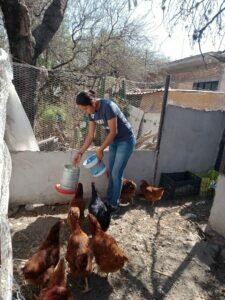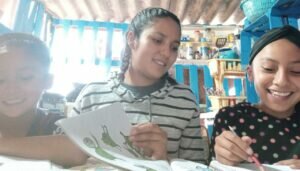En septiembre de 2020, ProLiteracy y Lancôme se propusieron identificar a mujeres de regiones de alta marginación en México y buscar su empoderamiento a través de un programa educativo bajo el marco de la iniciativa Write Her Future.
Si bien no cabe duda que en México las mujeres han incrementado su participación en la educación y en la vida profesional, en ciertas áreas remotas del país existe un número significativo de población adulta, en su mayoría mujeres, que vive en situación de rezago educativo.
Las últimas cifras de la UNESCO indican que en México existen 4.3 millones de adultos mayores de 15 años que no saben leer ni escribir. Estos adultos son en su mayoría personas mayores de 60 años, personas con discapacidad, trabajadores agrícolas, población indígena y mujeres. Es importante recalcar que de la población que no sabe leer, el 61% son mujeres.
 La iniciativa Write Her Future reconoce que fortalecer las habilidades de las mujeres para poder leer y escribir es un proceso que desencadena una transformación personal. Es así como en coordinación con Proyectos Laubach de Alfabetización en México (PLAMAC), aliado estratégico de ProLiteracy, se inició la implementación del programa de alfabetización para mujeres en tres comunidades rurales del Estado de Guanajuato con el objetivo de apoyar a las mujeres a continuar con su educación, obtener un mejor empleo o bien emprender un proyecto.
La iniciativa Write Her Future reconoce que fortalecer las habilidades de las mujeres para poder leer y escribir es un proceso que desencadena una transformación personal. Es así como en coordinación con Proyectos Laubach de Alfabetización en México (PLAMAC), aliado estratégico de ProLiteracy, se inició la implementación del programa de alfabetización para mujeres en tres comunidades rurales del Estado de Guanajuato con el objetivo de apoyar a las mujeres a continuar con su educación, obtener un mejor empleo o bien emprender un proyecto.
Mujeres como Sandra
Sandra tiene 27 años, está casada y tiene dos hijos de 7 y 10 años. Vive en San Juan, una comunidad rural muy pequeña con sólo una escuela de nivel preescolar. Sus hijos asisten a una escuela primaria en otra comunidad, San Miguelito. Su casa tiene electricidad pero no agua corriente. Tiene un teléfono celular pero no tiene acceso a Internet en casa. Para acceder a Internet, debe usar el Wi-Fi de un vecino o bien salir a los caminos para encontrar cobertura en su red móvil.
En su comunidad, la mayoría de las personas han creído que la educación formal no genera importantes beneficios para las niñas, por lo que Sandra dejó de estudiar la preparatoria cuando tenía 16 años. Ahora, Write Her Future le ha dado la oportunidad de retomar y continuar su educación para a su vez mostrarle a sus hijos la importancia de la educación y cómo ésta puede mejorar su futuro.
“No poder terminar la escuela no es un buen ejemplo para mis hijos, especialmente para mi hija. Quiero que sepa que no tiene que quedarse en casa, si estudia, puede hacer otras cosas,” dijo. “Si puedo terminar la preparatoria, mis hijos verán que ellos también pueden hacerlo.”
 A través de otra iniciativa, Sandra aprendió cómo construir un gallinero y criar pollos. Eventualmente podrá vender huevos y comenzar un negocio. El programa de alfabetización le dará a Sandra las habilidades para administrar mejor su negocio y aumentar las ventas.
A través de otra iniciativa, Sandra aprendió cómo construir un gallinero y criar pollos. Eventualmente podrá vender huevos y comenzar un negocio. El programa de alfabetización le dará a Sandra las habilidades para administrar mejor su negocio y aumentar las ventas.
“Podré tener más ideas porque leeré más información, entenderé mejor, tendré más confianza para poder vender más,” Dijo Sandra.
Siempre le ha gustado ayudar a otras mujeres a peinarse, y ahora cree que tal vez, “algún día pueda aprender a ser peluquera. Creo que es posible, ¿por qué no?”
Es verdad, ahora Sandra ha comprobado que mucho es posible. Cuando unas vecinas le dijeron que estudiar ya no era para ellas, Sandra respondió con una gran motivación para estudiar.
“Las mujeres a veces tienen miedo de aprender, pero es porque no sabemos. Si pudiéramos entender, dejaríamos de sentir miedo.”
Write Her Future Mexico Student Sees, with Literacy, So Much Is Possible
In September 2020, ProLiteracy and Lancôme Mexico set out to reach women in marginalized regions of Mexico and empower them with education through the Write Her Future initiative.
While there is no doubt that women have gradually made their way into professional careers in Mexico, there are still geographically remote areas of the country where there are a significant number of adults, mostly women, with no educational experience.
The latest figures from UNESCO indicate there are 4.3 million adults older than 15 in Mexico who cannot read or write. These adults are largely people 60 or older, people with disabilities, agricultural laborers, indigenous people, and women. Women account for 61 percent of the population that cannot read.
The Write Her Future initiative recognizes that strengthening women’s abilities to read and write triggers a personal transformation. So, with long-time ProLiteracy partner Proyectos Laubach de Alfabetización en México (PLAMAC), the Write Her Future literacy program was initiated to reach women in three rural communities in the State of Guanajuato with the goal of helping women continue their education, get a better job, or start a business.
Women like Sandra
 Sandra is 27 years old, is married, and has two children ages 7 and 10. She lives in San Juan, a very small rural community with only one preschool. Her children attend an elementary school in another community, San Miguelito. Her house has electricity but no running water. She has a cell phone but no internet access at home. To access the internet, she must either use a neighbor’s Wi-Fi or walk several streets to find coverage on her mobile network.
Sandra is 27 years old, is married, and has two children ages 7 and 10. She lives in San Juan, a very small rural community with only one preschool. Her children attend an elementary school in another community, San Miguelito. Her house has electricity but no running water. She has a cell phone but no internet access at home. To access the internet, she must either use a neighbor’s Wi-Fi or walk several streets to find coverage on her mobile network.
In her community, most people believe that girls do not benefit from formal education, and Sandra left high school when she was 16. Now, Write Her Future has given her the opportunity to continue her education and show her children the importance of education and how it can improve their future.
“Not being able to finish school is not a good example for my children, especially for my daughter. I want her to know that she doesn’t have to stay at home, if she studies, she can do other things,” she said. “If I can finish high school, then my children will see that they can do it too.”
Through another initiative, Sandra learned how to build a chicken coop and raise chickens. Eventually she will be able to sell eggs and start a business. The literacy program will give Sandra the skills to better manage her business and increase sales.
“I will be able to have more ideas because I will read more information, I will understand better, I will have more confidence to be able to sell more,” Sandra said.
She has always liked to help other women do their hair, and now she believes that maybe, “one day I can learn to be a hairdresser. I think it is possible, why not?”
Truly, Sandra has seen that now anything is possible. When some neighbors told her that studying was no longer for them, Sandra responded with the best motivation to gain education.
“Women are sometimes scared of learning, but it is because we don’t know. If we could understand then we will stop feeling fear.”